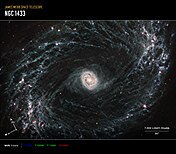| NGC 1433 | |
|---|---|
 Composite view of the galaxy NGC 1433 from ALMA and the Hubble Space Telescope Composite view of the galaxy NGC 1433 from ALMA and the Hubble Space Telescope | |
| Observation data (J2000 epoch) | |
| Constellation | Horologium |
| Right ascension | 03 42 01.553 |
| Declination | −47° 13′ 19.49″ |
| Redshift | 0.003590 |
| Heliocentric radial velocity | 1076±1 km/s |
| Distance | 46.2 ± 3.8 Mly (14.15 ± 1.15 Mpc) |
| Apparent magnitude (V) | 9.99 |
| Apparent magnitude (B) | 10.84 |
| Characteristics | |
| Type | (R'_1)SB(rs)ab |
| Apparent size (V) | 6.5′ × 5.9′ |
| Other designations | |
| HIPASS J0342-47, QDOT B0340269-472245, LDC 266, J034201.55-4713194, AM 0340-472, IRAS 03404-4722, SGC 034027-4722.8, 31, 6dFGS gJ034201.5-471319, LEDA 13586, SINGG HIPASS J0342-47, ESO 249-14, 2MASX J03420155-4713194, 034029-4724, ESO-LV 249-0140, PSCz Q03404-4722, HDC 257 J034201.55-4713194 | |
NGC 1433 (also known as PGC 13586) is a barred spiral galaxy with a double ring structure located in the constellation of Horologium. It was discovered by James Dunlop on 28 September 1826, and lies a distance of 46 million light-years from Earth.
NGC 1433 is a Seyfert galaxy with an active galactic nucleus. The central region of the galaxy displays intense star formation activity, with an irregular star-forming ring of 5″ (or 0.3 kpc) radius and weak radio wave emission. Star formation is also noticeable in the spiral arms but not the bar of the galaxy. NGC 1433 is being studied as part of a survey of 50 nearby galaxies known as the Legacy ExtraGalactic UV Survey (LEGUS). A jet of material flowing away from the central black hole of the galaxy extending for only 150 light-years has been found. It is the smallest molecular outflow ever observed in a galaxy beyond our own.
One supernova has been observed in NGC 1433. SN 1985P (type II, mag. 13.5) was discovered by Robert Evans on 10 October 1985.
NGC 1433 is member of the Dorado Group.
Gallery
-
 LEGUS, optical.
LEGUS, optical.
-
 Hubble Space Telescope, optical.
Hubble Space Telescope, optical.
-
 STSci DSS, optical.
STSci DSS, optical.
-
 James Webb Space Telescope, MIRI; compass.
James Webb Space Telescope, MIRI; compass.
References
- "ALMA Probes Mysteries of Jets from Giant Black Holes". ESO Press Release. Retrieved 18 October 2013.
- ^ "Search Results for NGC 1433". Astronomical Database. SIMBAD. Retrieved 18 October 2013.
- ^ "NASA/IPAC Extragalactic Database". Results for NGC 1433. Retrieved 2016-01-18.
- ^ Tikhonov, N. A.; Galazutdinova, O. A. (2020). "Distance to the Dorado Group". Astrophysical Bulletin. 75 (4): 384–393. arXiv:2009.04090. Bibcode:2020AstBu..75..384T. doi:10.1134/S199034132004015X. S2CID 221556782.
- Seligman, Courtney. "New General Catalogue Objects: NGC 1433". Celestial Atlas. Retrieved 25 November 2024.
- Beck, R.; Shoutenkov, V.; Ehle, M.; Harnett, J. I.; Haynes, R. F.; Shukurov, A.; et al. (August 2002). "Magnetic fields in barred galaxies. I. The atlas" (PDF). Astronomy and Astrophysics. 391: 83–102. arXiv:astro-ph/0207201. Bibcode:2002A&A...391...83B. doi:10.1051/0004-6361:20020642. S2CID 14749261.
- "Legacy ExtraGalactic UV Survey (LEGUS site)". website. Retrieved 21 Oct 2016.
- ^ "A galaxy with a glowing heart". ESA/Hubble Picture of the Week. Retrieved 8 August 2014.
- Evans, R. O.; Thompson, G. (1985). "Supernova 1985P in NGC 1433". International Astronomical Union Circular (4119): 2. Bibcode:1985IAUC.4119....2E.
- Chalabaev, A. A.; Cristiani, S. (1987). "Spectroscopy and Photometry of a Type-II Supernova 1985P in NGC1433". European Southern Observatory Conference and Workshop Proceedings. 26: 655. Bibcode:1987ESOC...26..655C.
- "SN 1985P". Transient Name Server. IAU. Retrieved 5 December 2024.
- "ALMA observations of feeding and feedback in nearby Seyfert galaxies: an AGN-driven outflow in NGC 1433" (PDF). Manuscript no. nugas1. Astronomy & Astronophysics. Retrieved 18 October 2013.
External links
- [REDACTED] Media related to NGC 1433 at Wikimedia Commons
| Astronomical catalogs | |
|---|---|
| NGC | |
| Constellation of Horologium | |||||||||
|---|---|---|---|---|---|---|---|---|---|
| Stars |
| ||||||||
| |||||||||
| Star clusters |
| ||||||||
| Galaxies |
| ||||||||
| |||||||||
This spiral galaxy article is a stub. You can help Misplaced Pages by expanding it. |